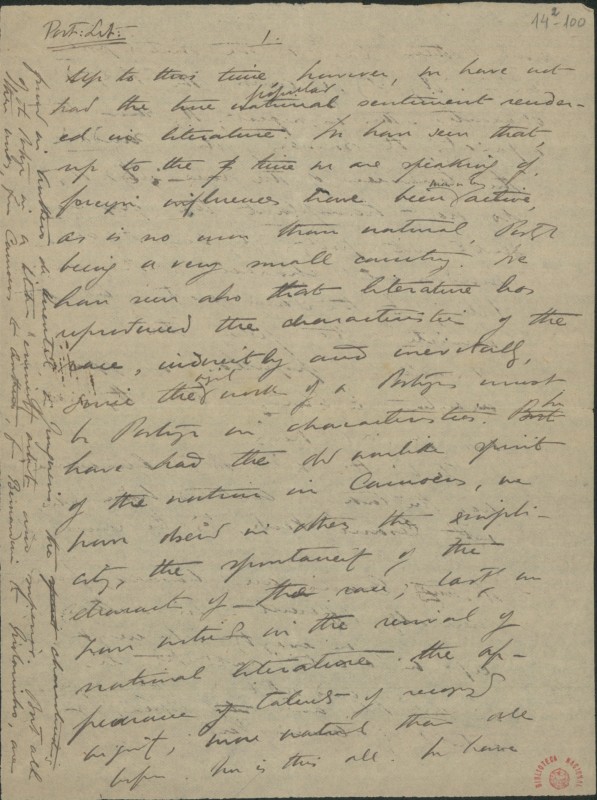Identificação
[BNP/E3, 142 – 100]
Portuguese Literature:
1.
Up to this time however, we have not had the true national[1] sentiment rendered in literature. We have seen that up to the time we are speaking of foreign influences have been more or less active, as in no more than natural, Portugal being a very small country. We have seen also that literature has reproduced the characteristic of the race, indirectly and inevitably, since the original work of a Portuguese must be Portuguese in characteristics. We have had the old warlike spirit of the nation in Camoens, we have observed in others the simplicity, the spontaneity of character of the race, lastly we have noticed in the survival of national literature the appearance of talents of recognised originality, more national than all before. Nor is this all. We have formed in Antero de Quental, in Junqueiro the characteristics of the Portuguese in a literature eminently |ardent| and superior. But all these authors, from Camoens to Antero, from Bernardim to Molarinho, are
[100v]
none of them based on the national poetic sentiment. By poetry, of course, the Portuguese character – this we repeat; they show the aspiration, the sadness, the saudade, the tenderness of the race. But they do not transplant the popular sentiment into poetry. They have the same fundamental character as popular, because belonging to the same nation, but the naiveté, the poesy, the {…} characteristically popular, as opposed to artistic, to literary – this they had not strived to have.
To bring these into Portuguese literature was the task of António Nobre who, with Cesário Verde, is[2] the reverses of {…}
He and Cesário are, however, fundamentally different – in method, in {…}, in everything. In everything, except in a certain sentiment that lies {…} and which is fully expressed in António Nobre and expressed, but controlled by Cesário Verde.
[BNP/E3, 142 – 100]
Literatura Portuguesa:
1.
Até agora, no entanto, não tivemos o verdadeiro sentimento nacional traduzido na literatura. Vimos que até ao momento falámos de influências estrangeiras que têm estado mais ou menos activas, como em nada mais do que natural, sendo Portugal um país muito pequeno. Vimos também que a literatura reproduziu a característica da raça, indirecta e inevitavelmente, uma vez que a obra original de um português deve ter características portuguesas. Tivemos o antigo espírito guerreiro da nação em Camões, observamos em outros a simplicidade, a espontaneidade de carácter da raça, enfim notamos na sobrevivência da literatura nacional o surgimento de talentos de reconhecida originalidade, mais nacional que tudo antes. E isso não é tudo. Formámos em Antero de Quental, em Junqueiro as características dos portugueses numa literatura eminentemente |ardente| e superior. Mas todos esses autores, de Camões a Antero, de Bernardim a Molarinho, não se encontram
[100v]
nenhum deles baseados no sentimento poético nacional. Pela poesia, claro, o carácter português - isso nós repetimos; mostram a aspiração, a tristeza, a saudade, a ternura da raça. Mas eles não transplantam o sentimento popular para a poesia. Têm o mesmo carácter fundamental que o popular, porque pertencem à mesma nação, mas a ingenuidade, o artificialismo poético, o {…} caracteristicamente popular, em oposição ao artístico, ao literário - isso eles não se esforçaram para ter.
Trazê-los para a literatura portuguesa coube a António Nobre que, com Cesário Verde, é o reverso de {…}
Ele e Cesário são, no entanto, fundamentalmente diferentes - no método, em {…}, em tudo. Em tudo, excepto num certo sentimento que subjaz {…} e que se encontra plenamente expresso em António Nobre e expresso, mas de modo controlado, por Cesário Verde.
[1] national /popular\
[2] is /are\


